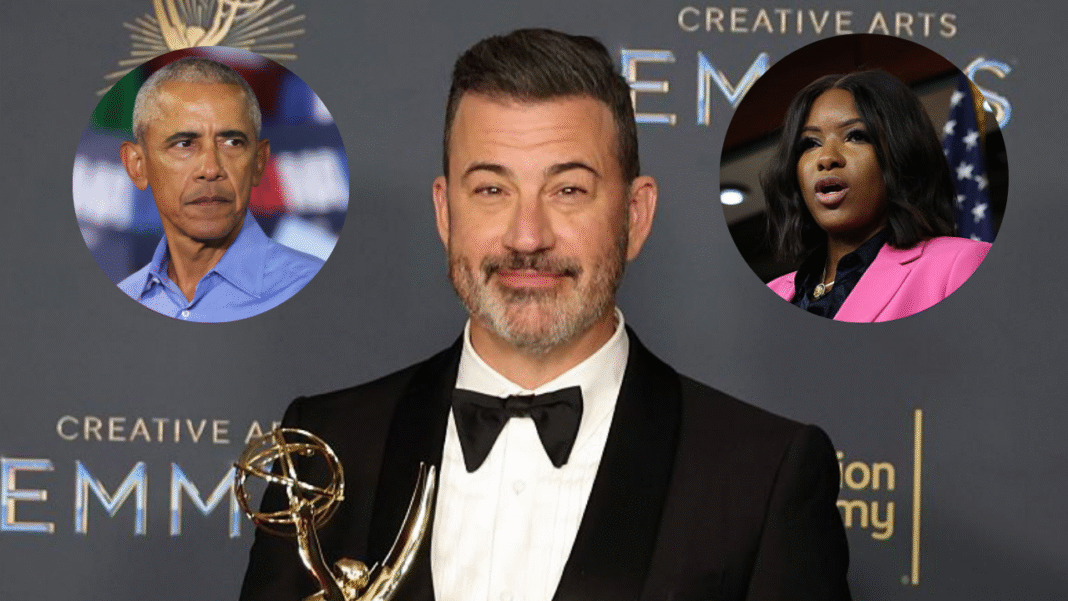Political Leaders Voice Concerns Over First Amendment Rights
Recently, a significant uproar has emerged from political leaders regarding the suspension of ABC’s “Jimmy Kimmel Live!”, a late-night show that has run for over two decades. This action followed backlash from conservative circles, particularly after Kimmel’s remarks concerning the tragic shooting death of Charlie Kirk. Critics argue that this suspension exemplifies a concerning trend toward the suppression of First Amendment rights under the Trump administration.
Obama’s Strong Response
Former President Barack Obama has been particularly vocal about this issue. He emphasized that the current administration’s intimidation of media outlets represents a dangerous level of “cancel culture.” In a poignant tweet, Obama stated, “After years of complaining about cancel culture, the current administration has taken it to a new and dangerous level by routinely threatening regulatory action against media companies unless they muzzle or fire reporters and commentators it doesn’t like.” This statement underscores a chilling implication that government pressure could stifle free speech and independent journalism.
Behind the Suspension
The suspension of Jimmy Kimmel’s show was not merely an isolated incident; it came at the behest of Brendan Carr, the Trump-appointed chairman of the Federal Communications Commission (FCC). Given that the FCC manages the licensing of ABC’s local stations, the implications of this political pressure were immediate and severe. Critics have speculated that media conglomerates, such as Nexstar Media Group, which is trying to acquire Tegna for $6.2 billion, might yield to governmental pressure due to potential merger approvals pending before the Trump administration.
Media Complicity and Broader Implications
Obama highlighted that media outlets capitulating to such pressure signal a broader crisis within America. The former president pointed out on social media, “This is precisely the kind of government coercion that the First Amendment was designed to prevent.” In doing so, he urged media companies to resist such coercive tactics instead of yielding to them.
The situation took a turn when Karen Attiah, a Black opinion columnist for The Washington Post, was fired following her social media posts addressing gun violence and perceived racial double standards in light of Kirk’s death. Attiah’s controversial remarks emphasized the racial dynamics tied to gun violence, drawing attention to the consequences of suppressing critical journalism in favor of appeasing political sentiments.
Voices from Congress
Dissenting voices in Congress have rallied against the political ramifications of Kimmel’s suspension. U.S. Rep. Jasmine Crockett from Texas condemned the situation, describing it as “anti-democratic” and lamenting that the First Amendment appears to be disregarded when it comes to critics of the MAGA agenda. She raised questions about the inconsistency in outrage over inflammatory statements made by conservative commentators and highlighted the selective valuing of lives and speech in media.
Call for Accountability
In response to Kimmel’s indefinite suspension, House Democrats, led by Rep. Hakeem Jeffries, have demanded the immediate resignation of Chairman Carr, describing his actions as a “corrupt abuse of power.” Democrats characterized the coercion faced by ABC as an assault on journalistic freedom, stating, “He has disgraced the office he holds by bullying ABC.” They warned that this trend of artist censorship and show cancellations poses a significant threat to American democratic values.
As midterm elections approach, Democratic leaders have pledged to ensure that the public is informed about the events surrounding Kimmel’s suspension and the broader implications of media compliance with political pressure. They asserted, “This will not be forgotten,” hinting at potential investigations and attempts to reclaim media independence.



